


Why is wound care so important?
When you have diabetes, nerve damage in your feet can make it easy to sustain an injury without feeling or knowing it. Left unnoticed and untreated, even just a scratch can become a dangerous ulcer open to infection, and that could have devastating consequences, including amputation. Poor circulation associated with diabetes inhibits your blood from delivering the healing nutrients your wound needs, and the longer it takes to heal, the more dangerous the situation becomes!
What should I do if I suffer a foot wound?
Treating wounds immediately – no matter how small — is vital to prevention of infection, ulceration, hospitalization, and amputation. Don’t let your wound get out of hand! If it’s small, you may be able to address it with home care, cleaning the injury with water only, drying it thoroughly, and applying antibacterial medication, then covering it with a bandage. Keep a close eye out for any signs of infection, including redness, swelling, or drainage. If you spot any of these symptoms, call us right away for an appointment. If the wound is large or has gone undetected for some time, contact us immediately.
What does wound care entail?
The first order of business is to prevent or treat infection. The wound will be cleaned and any dead tissue or debris cleared – a process called debridement. We will then apply medication and protect the area with a sterile dressing to be followed by a recommended period of off-loading (non-weight-bearing). You will need to use crutches, or a scooter or wheelchair to take pressure off the injury and allow the time it needs to heal. Antibiotics will also be prescribed, and your wound will be closely monitored.
How can I prevent foot wounds and diabetic ulcers?
Protecting your feet is of the upmost importance. Never go barefoot – not even indoors! Wear socks and shoes or hard-soled slippers and always check inside them before putting them on to ensure there are no obstructions, or irritating seams. Make sure footwear fits correctly, as well – ill-fitting shoes can rub and cause blisters or squish toes and cause nails to pierce the skin.
In addition, the best way to recognize if you have suffered a wound on your foot is to be diligent about your daily self-foot exams. When you do take off your footwear to shower or sleep, it’s the perfect time to look for any signs of abrasions, sores, or lesions. Setting a specific time each day will help you remember, and if you have sustained a wound, you will catch it early which is the key to avoiding serious complications. In the meantime, it is crucial that glucose levels are managed. Controlling your diabetes will in turn help with nerve issues and circulation.
If you have any questions, want more information, or need to make an appointment, don’t hesitate to call us. You can reach our Bloomington, IN office by dialing (812) 333-4422. We will make sure your wound is taken care of before the situation becomes serious!